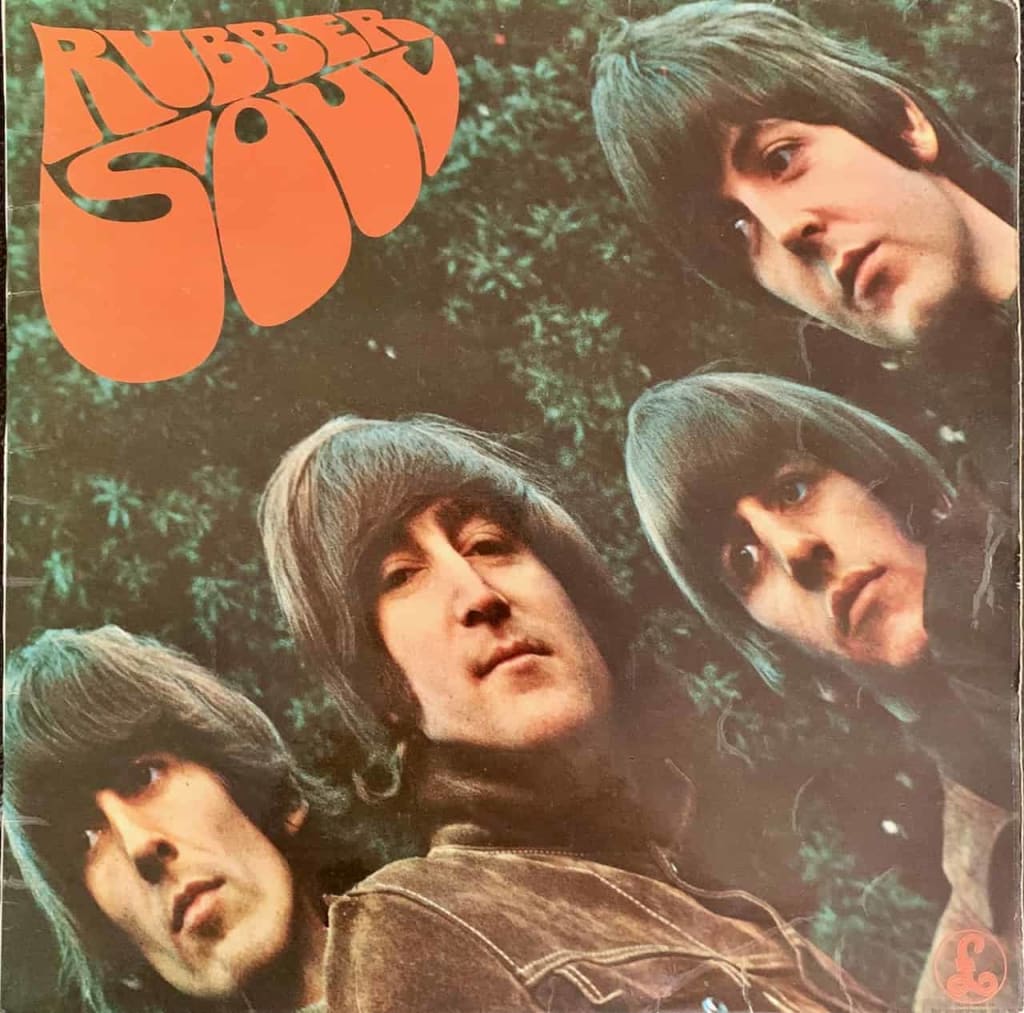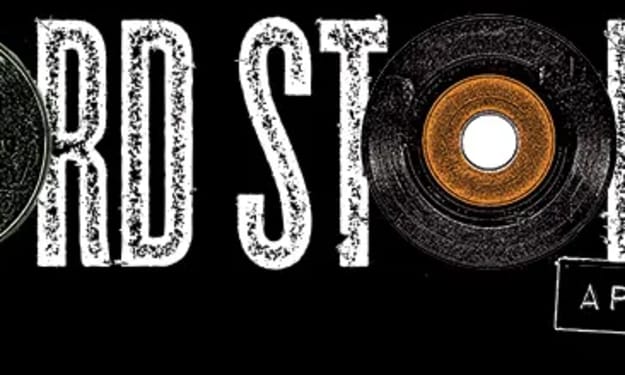The Beatles' Rubber Soul: Humour and Humility in a Time of Progress
A review of The Beatles’ 1965 album Rubber Soul and its fascinating place in the band’s development.

SIDE ONE
1 ‘Drive My Car’
2 ‘Norwegian Wood (This Bird Has Flown)’
3 ‘You Won’t See Me’
4 ‘Nowhere Man’
5 ‘Think For Yourself’
6 ‘The Word’
7 ‘Michelle’
SIDE TWO
8 ‘What Goes On’
9 ‘Girl’
10 ‘I’m Looking Through You’
11 ‘In My Life’
12 ‘Wait’
13 ‘If I Needed Someone’
14 ‘Run For Your Life’
An album characterised by self-derision and a palpable enjoyment for creating new and exciting sounds, Rubber Soul (1965) holds a special place in the famous band’s development. Recorded over a period of four weeks in the month of October and released in the UK on the 3rd of December, the album finished off a busy year for the band, having also released Help (both film and album) and various other singles in the same year.
1964-1967: the three, transformational years in which John Covach suggests Paul McCartney and John Lennon went from ‘pop songwriters to songwriting artists’. [1] Released in 1965, Rubber Soul found itself in a period change, development and evolution. And all while moving forward, the album was nevertheless well before the historic 1967 album Sgt. Peppers Lonely Hearts Club Band in which rock, for the first time, took ‘itself seriously’.[2] In fact, Rubber Soul is strongly characterised by exactly the opposite: humour and irony. Musically, this expresses itself in remnants of their classic rock foundations with cleverly manipulated fresh and modern experimental sounds and structures.
The album’s constantly developing sound is captured particularly well in its eclecticism. We encounter classic rock riffs, a taste of folk elements, new and exciting sounds and instruments, intimate and poetic moments as well as the ‘faux soul’ style the album’s title alludes to. ‘Rubber Soul’, is a play on words based on the growing ‘plastic soul’ style, characterised by disingenuous copies of the soul style, mainly among white groups of the era. With that said, let’s dive straight in.
We begin with ‘Drive My Car’. Written, as with most songs, by both McCartney and Lennon, the song firmly establishes a classic rock style, with slight blues influences. With its conventional structure, stylistically appropriate shout-like singing and rock guitar solo, the song doesn’t go far in making a case for the album’s ‘progressiveness’. However, in offering a stark contrast to the next song, it allows ‘Norwegian Wood’ to explore in full glory the band’s growing craftsmanship. ‘Norwegian Wood’ associates most closely with the folk style, but The Beatles offer new sounds and textures that push the style further. We begin with a short guitar melody, then repeated and layered with the sitar (used for the first time in the band’s history). ‘Norwegian Wood’’s poeticism and drastically different style to ‘Drive My Car’, confirms the album’s eclecticism. Even though taking on an ‘ABAA’ form (preceded by an introduction), Covach suggests that the song’s form is in fact a ‘modified ABAA structure’.[3] The song’s gentle storytelling and lack of a strict chorus, creates an atmosphere of organic musical and dramatic growth, despite the use of the active voice and action-oriented narrative. The addition of the sitar adds an otherworldly colour. And although most apparent in the introduction solo, it is present throughout the song, most importantly on the down beats of the A section. This subtly creates structure in an otherwise unconfined musical landscape. The sitar’s use also holds significant symbolic value. In being consistently doubled by another guitar, it symbolises the album’s transitory nature. This timid experimentation is also seen in its subtle modification of the commonly used ABAA form and the song’s continued adherence to the album’s (until then) short 2-3min song range. In fact, in being the shortest song of the album (and yet the most artistically rich), the song further amplifies the album’s self-aware nature. It’s almost as if they’re saying, ‘don’t worry, we’re evolving, but we won’t unleash our full genius just yet…’. ‘Norwegian Wood’ is a breath of fresh air. Its gentle and intimate nature gives it a certain humility only found in a band undergoing a process of fundamental musical maturation.
The album’s next two songs ‘You Won’t See Me’ and ‘Nowhere Man’ brings us back to a more upbeat style, all while still presenting their own unique elements. The latter song’s acapella beginning is an interesting moment. Its intimate and raw nature is once again symbolic of the ‘craftsmanship’ the album (but more specifically McCartney and Lennon) is attempting to establish. The entrance of the guitar and bass’ descending line prepares for the lyrics’ reflective nature. The harmonies created in this very first phrase create a certain melancholy that still somehow puts a smile on your face. Lyrics such as “nowhere”, “blind” and “doesn’t have a point of view”, evoke a tone of futility. The song and narrative feels void of any reason or point and in a strange way, harks back to a simpler time. The band achieves an ‘optimistic melancholy’ with a depth of meaning and humility seldom shown by other rock bands of the era.
In ‘Think for Yourself’ (by guitarist George Harrison) the band picks up in energy. And although in the context of a rough and more ‘rock-like’ style, the harmonies are oftentimes foretelling of their later psychedelic style. This is especially true in the layered voices’ parallel motion. ‘The Word’ is the first song of the album which takes on the ‘plastic soul’ style. It ironically plays with soul conventions and connotations: links to church gospels (the choral passages), religious preaching (excessive repetition of words such as ‘love’ and ‘sunshine’ and phrases like ‘spread the word’), and the inclusion of the (very artificial) organ.
In side one’s final song, ‘Michelle’, the band further pushes the ironic and comedic style already established in ‘The Word’. In this somewhat clumsy, but nevertheless sweet, proclamation of love, they used the clichéd ‘language of love’ (French) to bring their (ridiculously obvious) message home. This is helped by not so nuanced repetitive lines such as ‘I love you I love you I love you and ‘I want you I want you I want you’. Its lilting and pastiche waltz-like style is, for lack of a better word, a cute (albeit very clever) way to end this first side.
The second side begins with ‘What Goes On’, written by McCartney, Lennon and Richard Starkey (Ringo Starr). The song uses the American ‘country’ genre, with a banjo style accompaniment and dance like percussion beat. The alternation between the group-sung chorus and solo verses paints the picture of an American country band putting forward their best local singer. The song’s lyrics also mirror the common country music trope of a troubled love story. In the hilariously pathetic next song, ‘Girl’, even the title can’t be bothered to attempt complexity. Lennon’s comedically mopey voice wallows in the lyrics’ self-pity. With a short instrumental interlude evoking some kind of Mediterranean slow dance, the band flexes its stylistic prowess in being able to support complex musical ideas and sounds all while in a seemingly ‘simple’ song. This is also true in ‘I’m Looking Through You’, where the band uses the simplicity of the song’s structure and phrases to make the jarringly dissonant organ interventions all the more comical.
‘In My Life’ shares ‘Nowhere Man’’s contemplative character. Coincidentally, it also takes the 4th place on its respective side. Sung almost entirely in the past tense, the song offers a moment of intimate reflection. This is, again somewhat comically, accompanied by a ‘baroque-like’ solo on the keyboard in a faux-harpsichord sound. As with ‘Nowhere Man’, it offers a short rest from the album’s more upbeat songs. Beginning similarly to ‘You Won’t See Me’ and serving the same ‘pick-me-up’ purpose, ‘Wait’ offers the up-beat atmosphere continued through to the end of the album. The final two songs, ‘If I Needed Someone’ and ‘Run For Your Life’, subtly reiterate earlier used techniques. In ‘If I Needed Someone’, the parallel motion in the band’s combined voices is once again foretelling of their psychedelic style. And ‘Run For Your Life’ finishes the album off on an upbeat, folk-style note, complete with cliché country music conventions and a cheerful ending message of: “Na na na!”
More than anything, it is the underlying comical and optimistic (even in its more reflective moments) nature of this album which continues to fascinate me. It is what ties together an eclectic mix of songs. And it is precisely this eclecticism which exposes the album’s transitory purpose in the band’s larger musical development. Its progressivism is well hidden, and dealt with incredible humility. Whether out of timidity or maturity, it is nevertheless a testament to the band’s growing compositional and musical flexibility. This is most apparent in the songs ‘Norwegian Wood’, ‘Nowhere Man’ and ‘Michelle’. The album goes a long way in explaining how the composers went from ‘songwriters’ to ‘craftsmen’ and the band from pop superstars to history-defining artists. And so, although not my favourite album of the band’s many, it cannot be denied that it occupies a fascinating place in The Beatles’ transformation into one of the most cherished bands in history.
Rita Fernandes
References
[1] Kenneth Womack and Todd R. Davis, ed., Reading the Beatles (New York, 2006)
[2] Ibid
[3] Ibid
About the Creator
Rita Fernandes
Musician with a passion for writing and sharing ideas.
Creator of the music blog www.listenandwrite.org






Comments
There are no comments for this story
Be the first to respond and start the conversation.